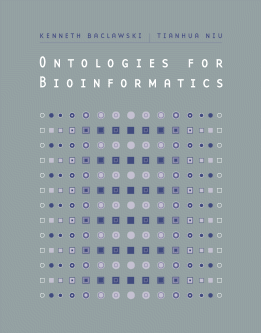
MIT Press
October 2005
ISBN
0-262-02591-4
7 x 9, 440 pp., 70 illus.
$45.00/£29.95 (CLOTH)
|
|
Recent advances in biotechnology, spurred by the Human
Genome Project, have resulted in the accumulation of vast amounts of new
data. Ontologies -- computer-readable, precise formulations of concepts (and
the relationship among them) in a given field -- are a critical framework for
coping with the exponential growth of valuable biological data generated by
high-output technologies. This book introduces the key concepts and
applications of ontologies and ontology languages in bioinformatics and will be
an essential guide for bioinformaticists, computer scientists, and life science
researchers.
The three parts of Ontologies for Bioinformatics ask, and answer, three
pivotal questions: what ontologies are; how ontologies are used; and what
ontologies could be (which focuses on how ontologies could be used for
reasoning with uncertainty). The authors first introduce the notion of an
ontology, from hierarchically organized ontologies to more general network
organizations, and survey the best-known ontologies in biology and
medicine. They show how to construct and use ontologies, classifying uses into
three categories: querying, viewing, and transforming data to serve diverse
purposes. Contrasting deductive, or Boolean, logic with inductive reasoning,
they describe the goal of a synthesis that supports both styles of
reasoning. They discuss Bayesian networks as a way of expressing uncertainty,
describe data fusion, and propose that the World Wide Web can be extended to
support reasoning with uncertainty. They call this inductive reasoning web the
Bayesian web.
Kenneth Baclawski is Associate Professor of Computer Science at Northeastern
University.
Tianhua Niu is Assistant Professor of Medicine at Harvard Medical School and
Director of Bioinformatics, Division of Preventive Medicine, at Brigham and
Women's Hospital, Boston.
|
|
"This timely and important book provides lucid, provocative, and
comprehensive coverage of essential topics related to ontologies and their
critical applications in bioinformatics. Written by leading experts in the
field, the book is readable and highly informative. It is highly recommended
for undergraduate and graduate students in biology, computer science, and
medicine, as well as for researchers interested in bioinformatics and genomic
science."
--Yi Pan, Chair and Professor, Department of Computer Science, Georgia State
University, Editor-in-Chief, International Journal of Bioinformatics Research
and Applications
"Given the current explosion of biological data in multiple dimensions, it
is time to think systematically about strategies and techniques to not only
store, but also integrate and represent them in knowledge-oriented
ways. Ontology is the solution, and this book is an excellent effort to
evaluate a number of alternative ontology-exchange languages, and to recommend
them for use within the larger bioinformatics community."
--Bo Yuan, Departments of Biomedical Informatics and Pharmacology, The Ohio
State University
|
|
|
